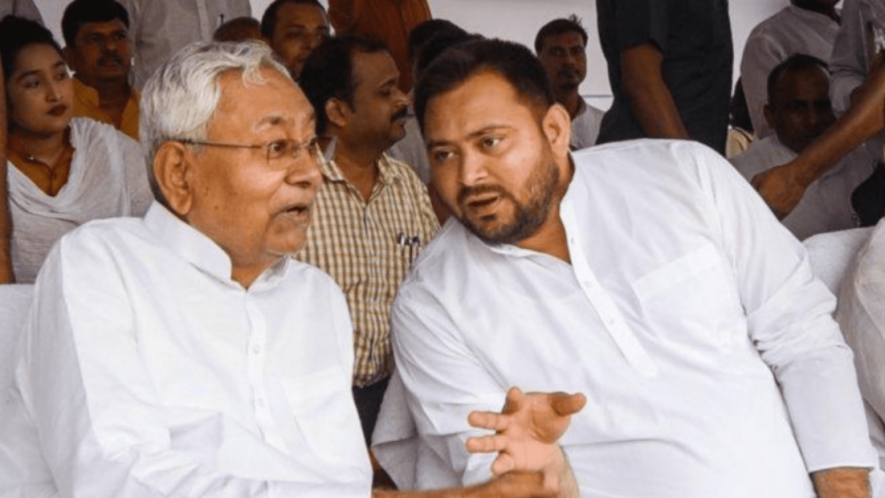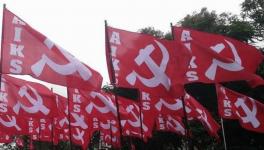Bihar: Mahagathbandhan Allies Accuse BJP of Openly Opposing Caste Survey

Image Courtesy: PTI
Patna: Accusations fly as two major allies within Bihar's ruling Mahagathbandhan coalition, the Janata Dal (United) (JD-U) and the Rashtriya Janata Dal (RJD), squarely target the Bharatiya Janata Party’s (BJP's) top leadership for openly obstructing the ongoing caste survey within the state. Both parties have accused the BJP of attempting to disrupt the survey, prompting tensions within the political landscape.
Leaders of the JD-U and RJD have directly confronted the BJP, attributing central government interference in the Supreme Court (SC) as an attempt to undermine the ongoing caste survey. Their accusations stem from concerns that the central government's involvement may have far-reaching consequences for the survey's progress.
The rift between the ruling coalition and the BJP centres on the recent intervention by the central government in the hearing of petitions challenging the Patna High Court's decision to proceed with the caste survey in Bihar. The Supreme Court, on August 21, summoned the central government to provide its response within a week's time.
While the SC has declined to halt the high court's verdict unless convinced of its erroneous nature, the matter has been scheduled for further hearing on August 28.
Earlier this month, the Patna High Court granted permission for the completion of the long-awaited caste survey. The court's nearly 100-page ruling dismissed all Public Interest Litigations (PILs) seeking a suspension of the survey.
Promptly following the court's decision, the Bihar government initiated the third and final phase of the survey, with a majority of fieldwork concluded by mid-August. The remaining data collected during the survey is currently being finalised for upload.
State Advocate General PK Sahi asserted the government's right to conduct the caste survey, emphasising its authority to gather socio-economic data that inform welfare policies.
JD-U leader Tejashwi Yadav, followed by RJD, denounced the BJP's actions against the caste survey. Tejashwi Yadav remarked, "Now things are clear, earlier BJP was opposing while hiding and playing from behind against caste survey. But today BJP is opposing it openly. At last, BJP’s real face on caste survey has exposed." He further questioned the central government's apprehension towards a scientifically conducted caste-based survey and implied that political motives might influence it.
The JD-U's national president, Lalan Singh, a close associate of Bihar Chief Minister Nitish Kumar, affirmed that the BJP's central government intervention unveils its true intentions in opposing the caste survey. Singh stated that while the BJP may project a pro- Other Backward Classes (OBC) face for electoral gains, its actions demonstrate a contrary stance against marginalised sections of society.
The JD-U spokesperson, Neeraj Kumar, echoed these sentiments, highlighting the BJP's open opposition to the caste survey despite the high court's endorsement.
Bihar Minister Vijay Kumar Choudhary claimed that the BJP's primary objective is to disrupt the survey. Despite the initial attempt to derail the process through filed PILs, the Bihar government's vigilance and the high court's dismissal allowed the survey to proceed.
The caste survey's second phase began in April, despite opposition from influential segments of society. The first phase, initiated in January, aimed to identify the number of households across Bihar. Subsequent phases involved the collection of caste and socio-economic data from each household.
This survey holds the potential to strengthen the coalition's support base among OBCs and Economically Backward Classes (EBCs), fulfilling a significant promise made to these communities.
Bihar's leaders, Kumar and RJD chief Lalu Prasad Yadav, long advocates of Mandal politics, have championed a Caste Census since 2015. They believe this data will inform targeted development plans and uplift historically deprived communities.
Kumar emphasised the survey's importance in identifying individuals from economically disadvantaged backgrounds. The last Caste Census was conducted in 1931.
While the BJP-led Central government previously rejected a national caste census two years ago, the ongoing dispute highlights the intricate interplay between politics, social dynamics, and the quest for accurate socio-economic data.
Get the latest reports & analysis with people's perspective on Protests, movements & deep analytical videos, discussions of the current affairs in your Telegram app. Subscribe to NewsClick's Telegram channel & get Real-Time updates on stories, as they get published on our website.
























